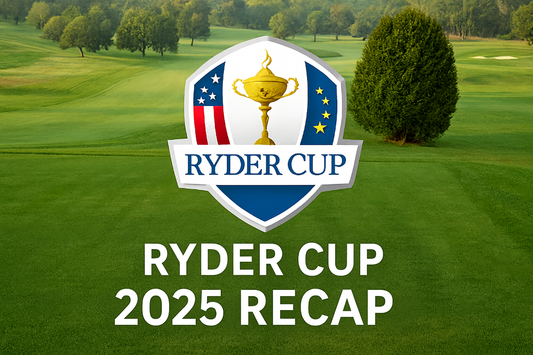Superior performance on the greens overcame American dominance from tee to green in a thrilling 15-13 finish
Bethpage Black hosted a Ryder Cup that defied conventional wisdom. Europe claimed victory not through superior ball-striking or course management, but through an ancient art that separates champions from also-rans: putting.
The 2025 competition came down to Shane Lowry's final birdie putt. When it dropped, Europe had secured a 15-13 triumph built on an eight-stroke advantage with the putter that completely negated America's six-shot superiority from tee to green. That 14-stroke swing decided everything.
Friday: Europe Seizes Early Control
Morning Foursomes Set the Tone
Europe opened with ruthless efficiency. Three commanding victories in the first three matches marked the first time European players had swept the opening trio on American soil in Ryder Cup history.
Jon Rahm and Tyrrell Hatton demolished Scottie Scheffler and Russell Henley, 5&4. The world number one never recovered from early deficits that became familiar territory, his third consecutive foursomes disaster dating back multiple competitions. Spain and England proved relentless partners, suffocating any American momentum before it developed.
Tommy Fleetwood and Rory McIlroy earned their "Fleetwood Mac" nickname from delighted galleries while dismantling Xander Schauffele and Patrick Cantlay, 5&3. Surgical precision defined their play. Both Europeans drained crucial putts throughout, extending their career foursomes record to 3-0-0.
Ludvig Åberg and Viktor Hovland completed the early carnage, defeating Collin Morikawa and Sam Burns 4&3. Åberg, competing in just his second Ryder Cup, showed zero nerves while maintaining his perfect 3-0-0 foursomes mark.
Cameron Young prevented total disaster. The New York native, paired with Justin Thomas, delivered a vital 4&2 victory over Matt Fitzpatrick and Rasmus Højgaard. Local knowledge and crowd energy proved decisive for Young's breakthrough moment.
Afternoon Four-Ball: Europe Maintains Momentum
Europe stretched their advantage to 5.5-2.5, though Americans showed improved fight in the four-ball format.
Young's excellence continued. Partnering again with Thomas, he secured a dominant 6&5 victory over Viktor Hovland and Ludvig Åberg. Young's achievement was historically significant, the first American rookie since Patrick Reed in 2014 to win his opening two matches by four-hole margins or greater.
European answers came swiftly. Fleetwood and McIlroy captured their second daily victory, beating Harris English and Collin Morikawa 3&2. Their partnership never trailed across both Friday encounters, demonstrating remarkable chemistry.
Rahm and Hatton added another point with a 2&1 triumph over Bryson DeChambeau and Scottie Scheffler. Scheffler's second loss created an unprecedented 0-2 deficit for the world's top-ranked player.
Justin Rose and Robert MacIntyre halved the final match against Xander Schauffele and Patrick Cantlay, giving Europe a commanding three-point cushion entering Saturday's battles.
Saturday: European Dominance Reaches Historic Levels
Morning Foursomes: The Floodgates Open
Saturday morning silenced American supporters. Europe captured three of four matches, building an imposing 8.5-3.5 lead that positioned them perfectly for cup retention.
Young provided America's lone celebration. Partnering with DeChambeau, he secured a 4&2 victory over Fitzpatrick and Åberg. The New Yorker's chip-in at the par-3 third ignited local supporters while crucial shots throughout maintained his perfect 2-0 record.
Europe owned everything else. Fleetwood and McIlroy continued their dominance with a 3&2 defeat of English and Morikawa. Their second consecutive foursomes victory developed through early control from holes two through five, featuring long putts that devastated American confidence.
Rahm delivered Saturday's signature moment during his partnership with Hatton in their 3&2 victory over Schauffele and Cantlay. His chip-in from an impossible lie at the eighth hole defied physics before dropping, sending European sections into delirium.
MacIntyre and Hovland completed the surge with a 1-up victory over Scheffler and Henley in the anchor match. Scheffler, desperate for points after Friday's catastrophes, fought back repeatedly only to watch Europeans answer every challenge.
Afternoon Four-Ball: Europe Reaches Historic Territory
The afternoon session produced unprecedented Ryder Cup history. Europe's lead expanded to 11.5-4.5, the first team since 1979 to accumulate 11.5+ points before singles. More remarkably, they became the first squad ever to sweep all four sessions on foreign soil.
Mathematics became brutal for America. No team had overcome an 8.5-3.5 deficit (or worse) after three sessions to capture the Ryder Cup. Now they faced an even steeper challenge.
European dominance was comprehensive. They controlled the cumulative foursomes battle decisively, extending a trend that saw them post a 10-2 alternate shot record since the 2023 Ryder Cup began. The nine-competition streak of home team foursomes advantages crumbled under European precision and chemistry.
Sunday: The Improbable American Surge
Singles Drama Unfolds
Sunday delivered one of Ryder Cup history's most remarkable comeback attempts, one that nearly succeeded against impossible odds.
Europe needed just three points from twelve matches to retain the cup. What followed was American theater at its most compelling.
Young, carrying New York's hopes, provided the essential spark. His 10-foot putt on eighteen against Justin Rose didn't merely find the cup but opened floodgates to pandemonium. Captain Keegan Bradley watched it drop with obvious relief: "When we sent out Cam Young first from New York to lead us out, we had to have that match. He went out there in front of the whole world, in front of his home state, and made a 10-footer to beat Justin Rose, who is an all-time Ryder Cupper."
Thomas followed with victory. Then came DeChambeau's miraculous resurrection. Five down after six holes to Fitzpatrick, DeChambeau somehow clawed back to halve, a result that defied logic and probability. Bradley couldn't contain his amazement: "Bryson was 5-down after six. Got that match back to even. You know, with the 28-3 references the other night, everything had to happen exactly the way – for them to win, and it was looking for a second like it was happening."
The statistical impossibility became clear. Europe won just one Sunday singles match, their lowest total since 1959. America collected 8.5 singles points, matching the highest tally in the modern twelve-match format.
Scheffler found redemption defeating McIlroy in the first-ever singles meeting between the world's top two players. "It was probably one of the lowest moments of my career," Scheffler reflected, "but it turned out to be one of the most special just because I've got great friends in this room."
For ninety minutes, destiny appeared within American grasp. Each victory electrified crowds. Red numbers accumulated on leaderboards. Desperation crystallized into genuine belief.
Lowry's birdie putt on eighteen ended the dream, sealing Europe's cup retention and concluding the most inspiring defeat in recent memory.
The Putting Factor: How Europe Won on the Greens
European Mastery with the Flat Stick
Final statistics revealed the victory's true foundation: putting performance that neutralized American superiority everywhere else. While America gained six shots from tee to green, Europe's eight-stroke putting advantage created that decisive fourteen-shot swing.
The numbers were startling. Eight of the nine top putters after two days wore European colors. Four Europeans gained more than one stroke on greens weekly, while five of the six best putters represented Europe.
Rose delivered the tournament's most dominant individual putting display, gaining +4.56 strokes in Session 4 alone. His excellence was complemented by teammates who consistently found the bottom when pressure peaked.
McIlroy, ranked seventh among PGA Tour putters entering competition, gained 0.597 strokes on greens. Fleetwood added 0.404 strokes. Fitzpatrick contributed 0.326 strokes. European putting depth was remarkable. Rahm, Hovland, Hatton, Straka, Lowry, and MacIntyre all ranked among tournament leaders.
American Struggles on the Greens
The contrast proved stark and decisive. Four of the six worst putters were Americans, with Thomas ranking last and losing two+ strokes with his putter.
Young stood as America's lone bright spot on greens, gaining +0.12 strokes while ranking among the top nine. His putting prowess, combined with local knowledge and crowd support, fueled his perfect 3-0-0 record.
Schauffele, despite his clutch reputation, lost shots on greens. Cantlay, known for "dagger putts" under pressure, showed occasional flashes Saturday but disappointed overall on putting surfaces.
The Decisive Moments
Several crucial putts determined outcomes. Lowry's massive cup-retaining putt Sunday became the tournament's defining image, a European delivering under ultimate pressure while Americans struggled to match critical moments.
Throughout the week, Europeans consistently made putts that mattered. From Fleetwood's thirty-footer in Saturday morning foursomes to McIlroy's twenty-two-foot response, Europeans seemed to possess supernatural green-reading abilities at Bethpage Black.
Putting statistics explained why Europe's narrow victory felt inevitable despite dramatic Sunday heroics. While Americans fought valiantly and nearly achieved the impossible, their inability to match the European putting over 72 competition holes proved insurmountable.
Legacy of a Classic
Bethpage Black 2025 will be remembered as competitive golf at its finest, decided by razor-thin margins and golf's most fundamental skill. Europe's victory, constructed on putting excellence and sustained through three days of intense pressure, demonstrated that match play's crucible rewards whoever makes the most putts.
America's Sunday singles performance (8.5 points from twelve matches) will outlast defeat's disappointment. They proved impossibility becomes negotiable under pressure, that mathematics bend when champions refuse to surrender.
For Europe, this victory represented something deeper: validation that team chemistry, putting prowess, and collective belief can overcome individual talent and home-course advantage. Luke Donald joined Tony Jacklin as the only European captains to win consecutive Ryder Cups.
The final margin (15 to 13) was the closest since 2012, ending five consecutive blowouts. In an era of increasingly lopsided competitions, Bethpage Black delivered the drama and tension that makes the Ryder Cup golf's most compelling team event.
Putting statistics tell Europe's victory story, but American resilience memories will endure equally long. The most inspiring victories sometimes slip away at the last moment. The most decisive advantages sometimes measure mere inches on putting greens.





